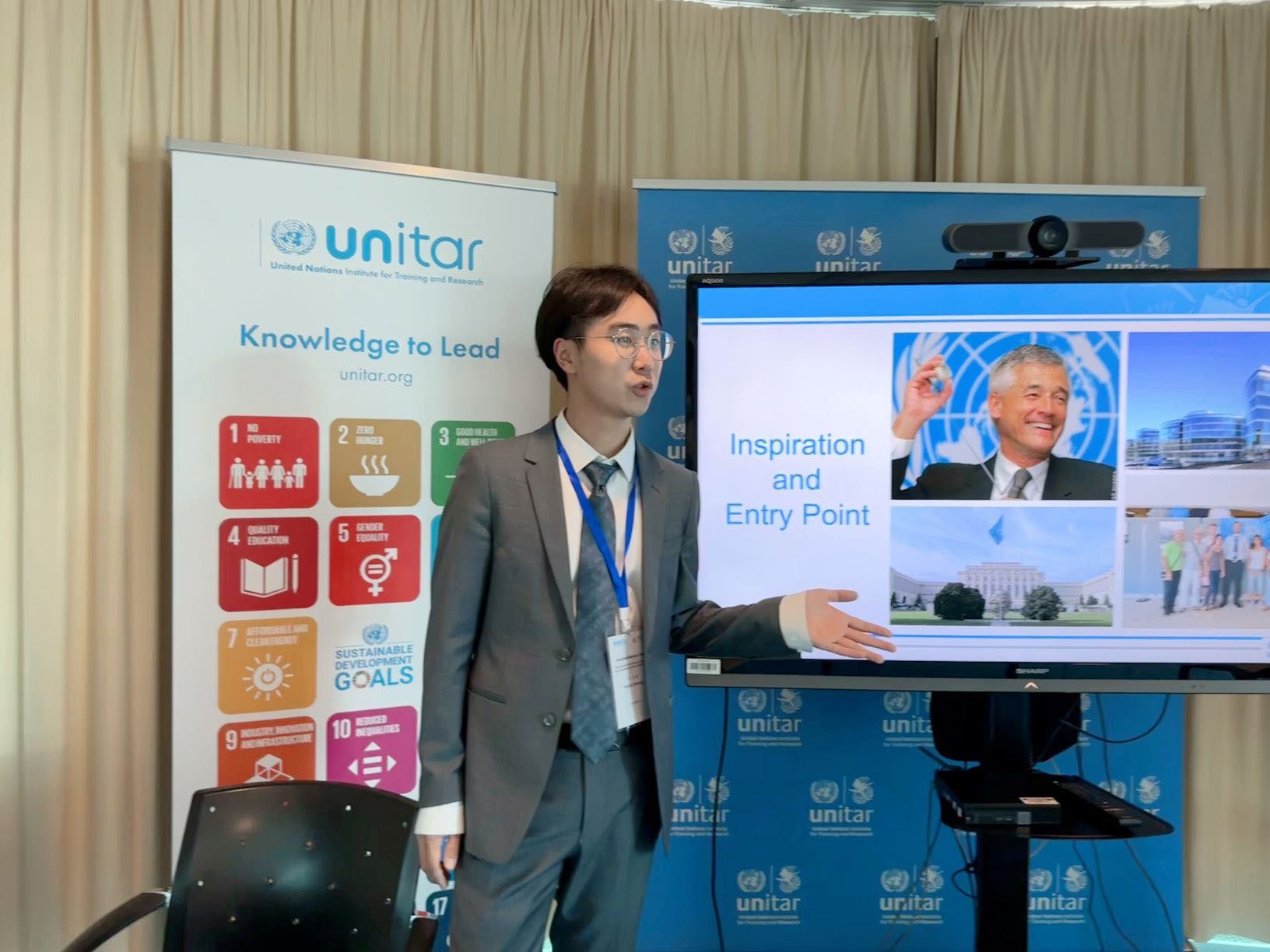Gen Z gains hands-on experience at UN programs, tackling global challenges and learning how to make a meaningful international impact.

At 9 am, the United Nations Development Programme (UNDP) China Office starts to buzz with activity. Wang Zhisheng and his colleagues dive into their day: tracking project progress, coordinating with partner departments, and preparing materials for meetings.
These seemingly routine tasks are closely tied to the pulse of global governance.
"I'd always wanted to intern at the UN because I wanted to be directly involved in global affairs," Wang said. "Back then, I thought being an interpreter at international conferences was the coolest job in the world."
His journey with the UN began during his university years, with his first internship at UNESCO three years ago. Since then, he has worked with five different UN agencies and now serves as a project coordination assistant at UNDP.
READ MORE: Youth drive change at Movers Camp
This year marks the 80th anniversary of the UN and the 30th anniversary of the World Programme of Action for Youth. Through their involvement with the UN and other international organizations, young people are transforming from "bystanders "into "actors" on the global stage.
"Young people naturally keep pace with the times and carry the imprint of their era," Wang said, emphasizing their growing role in global governance.
He noted that Gen Z tends to have stronger personalities, communicate more directly, and demonstrate higher execution capabilities. "These qualities can boost efficiency in a large institution like the UN," he said. "Moreover, young people adapt quickly to new technology and software — their digital skills are becoming ever more valuable."
Multiple access
Lu Yige, a 29-year-old from Nanning, Guangxi Zhuang autonomous region, interned at the International Institute for the Unification of Private Law (UNIDROIT), a Rome-based organization established in 1926.
Although UNIDROIT is independent of the UN, it maintains close cooperation with it and is widely regarded as an important forum for the harmonization of private law.
During his internship, Lu contributed to preparing a protocol under the 2001 Cape Town Convention, which seeks to establish an international system for secured transactions in mobile equipment.
He was responsible for analyzing trade data from various countries to provide reference materials for discussions on potential accession to the protocol.
"Every piece of research I conducted, every study I undertook, and every task I completed in meetings contributed to the ongoing work of strengthening an important international legal framework," Lu said proudly. "The conclusion of international treaties was something I had only read about in textbooks, but now it was unfolding right before me, in my own hands."
Working in a multilingual, cross-cultural environment also presented challenges.
"Every day, I communicated and collaborated with staff, government officials, and legal experts from different countries, which often led to clashes of perspectives," Lu explained. "I had to learn how to build consensus amid such diversity."
From his experience, Lu believes that working in international organizations requires three major skills: language proficiency, professional expertise, and communication abilities. These skills, he noted, should be cultivated gradually through consistent learning and practice.
For example, Lu began participating in Model United Nations activities in high school in 2012. He sees Model UN as an essential introduction to understanding the basic principles of global governance and the operation of international organizations.
Wang also offered advice for young people interested in international work: nearly every UN agency in China maintains its own social media accounts, where they regularly post recruitment information. He also recommended that young people explore remote opportunities through official platforms like UN Volunteers.
"Don't think of UN work as distant or untouchable," Wang said. "In practice, it involves tangible, concrete tasks. No matter your major, there's a place for you within UN agencies." He added that fields such as languages, international politics, and economics are particularly versatile.
Global citizen
The UN itself offers capacity-building programs for groups such as diplomats from developing countries and emerging young leaders. The United Nations Institute for Training and Research (UNITAR), directly affiliated with the UN General Assembly, is one such institution.
Zang Yixuan, 27, from Mudanjiang, Heilongjiang province, interned at UNITAR in 2024, primarily working on promoting the Sustainable Development Goals.
Having studied abroad since university, Zang has extensive international experience. However, he observed that the participation and influence of Chinese youth in the UN and other international organizations remain limited.
According to him, although China is the second-largest contributor to the UN budget, Chinese nationals make up less than 3 percent of UN civil servants — lower than all the other four permanent members of the Security Council.
"This data is not proportional to our contributions," Zang said.
He believes that for Chinese youth to make their voices heard on the international stage, they must not only understand their own country but also embrace the vision and responsibility of a "global citizen".
ALSO READ: Making a difference in Africa
"A global citizen is not a specific identity but a concept and set of values," he explained. "If you care about international issues like educational equity and poverty, and want to actively participate and make a difference, then you're embodying what it means to be a global citizen."
Zang pointed out that the world today faces challenges that transcend national borders — from climate change to the global impacts of artificial intelligence — making the role of the UN and other international organizations even more critical than ever.
At the same time, non-state actors — including youth groups, municipal governments, private enterprises, and NGOs — are increasingly involved in agenda-setting, negotiations, and policy implementation.
"For Gen Z, we don't need distant, lofty institutions; we need organizations that respond efficiently to our concerns," Zang said. "I hope more young people will have a voice on the international stage in the years to come."
Shan Zheng contributed to this story.
Contact the writer at guiqian@i21st.cn


